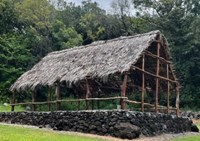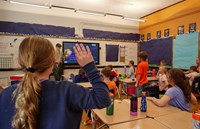- Lesson Plan (37)
- Field Trips (7)
- Distance Learning (6)
- Student Activities (3)
- Other Education Materials (2)
- Guest Speakers (1)
- Teacher Reference Materials (1)
- Glacier National Park (7)
- Indiana Dunes National Park (5)
- Lake Clark National Park & Preserve (5)
- Lake Mead National Recreation Area (5)
- New Orleans Jazz National Historical Park (5)
- Acadia National Park (4)
- Sleeping Bear Dunes National Lakeshore (4)
- Everglades National Park (2)
- Florissant Fossil Beds National Monument (2)
- Show More ...
- Science (43)
- Social Studies (21)
- Literacy and Language Arts (15)
- Math (7)
- 6-8.RH.1 (6)
- 6-8.RH.2 (6)
- 9-10.RH.1 (6)
- 9-10.RH.2 (6)
- 9-10.RH.4 (5)
- 9-10.RH.10 (4)
- 6-8.RH.10 (3)
- 8.W.3.a (3)
- 8.W.3.b (3)
- Show More ...
Showing 56 results for lake ...
5th Grade Virtual Field Trip - Exotic Invaders
2nd Grade Virtual Field Trip - Nature's Neighborhoods
3rd Grade Virtual Field Trip - Amazing Adaptations
- Type: Lesson Plan
- Grade Levels: Upper Elementary: Third Grade through Fifth Grade
4th Grade Virtual Field Trip - Growing Communities
- Type: Lesson Plan
- Grade Levels: Upper Elementary: Third Grade through Fifth Grade
1st Grade Virtual Field Trip - Who Lives Here?
He Aha Lā He Kūkulu?
Great Lakes Piping Plover
- Type: Distance Learning
- Grade Levels: Upper Elementary: Third Grade through Fifth Grade
Invasive Species in the Great Lakes
- Type: Lesson Plan
- Grade Levels: Upper Elementary: Third Grade through Fifth Grade
- Type: Lesson Plan
- Grade Levels: High School: Ninth Grade through Twelfth Grade

Students will learn about the Great Lakes and be introduced to the ecological impact of invasive species in this region. An optional pre-site program is designed to orient students to terminology used by land managers when controlling invasive species. Students will watch the virtual program in which National Park Service rangers will talk about the Great Lakes and introduce the concept of invasive species to classrooms. Fish and Wildlife Service biologist focus on sea lamprey and their control.
- Type: Lesson Plan
- Grade Levels: High School: Ninth Grade through Twelfth Grade

Future Civil War Major General and President Ulysses S. Grant, started developing his leadership skills as a 2nd Lieutenant in the Battle of Resaca de la Palma. Grant’s Memoirs, written 39 years after the battle, mentioned his experience in the battle. Students review a primary and secondary document about the Battle of Resaca de la Palma. The primary document is part of Grant’s Memoirs. The secondary document is a lithograph of the Battle. Afterwards, they answer questions about the documents.
Wandering the Watershed Video Questions
- Type: Student Activities
- Grade Levels: Upper Elementary: Third Grade through Fifth Grade
Find out about watersheds in the Great Lakes Basin.
Gran Quivira: A Blending of Cultures in a Pueblo Indian Village
- Type: Lesson Plan
- Grade Levels: Middle School: Sixth Grade through Eighth Grade
Watershed Lessons
Lesson 5 - CODED SPIRITUALS, METAPHOR IN AFRICAN AMERICAN SPIRITUALS
- Type: Lesson Plan
- Grade Levels: High School: Ninth Grade through Twelfth Grade
Lesson 6 - RESEARCHING CONTEMPORARY SLAVERY
- Type: Lesson Plan
- Grade Levels: High School: Ninth Grade through Twelfth Grade
Historical Characters
- Type: Student Activities
- Grade Levels: Middle School: Sixth Grade through Eighth Grade

In this activity, students will learn about nine key participants in the Battles of Palo Alto and Resaca de la Palma and the Siege of Fort Brown. They will discover how the personalities of these key leaders helped them during these clashes and influenced their outcome. Students them compare their own personality traits to discover how they are like or different from these leaders.
Organisms in and Around Water
- Type: Lesson Plan
- Grade Levels: Middle School: Sixth Grade through Eighth Grade

• Students will take a look at different ways water makes its way to a pond/lake. • Students will also be thinking about how that water carries contaminants and sediment and what impact that has on ponds/lakes. • Students will make a food chain and/or a food web to share what biotic factors play a role in watersheds.
ECO Rangers Summer Camp
- Type: Student Activities ... Other Education Materials
- Grade Levels: Upper Elementary: Third Grade through Fifth Grade

Explore what lives in our lakes, ponds, streams, forests, and prairie lands. Do the same macros live in the creeks and ponds? What birds and animals live in the prairie lands vs woodlands? Fish the lakes and rivers, fine tune your archery marksmanship, net for macros in ponds, and search for the birds in our Missouri’s public lands.
Lesson 4 - ESCAPE
- Type: Lesson Plan
- Grade Levels: High School: Ninth Grade through Twelfth Grade

This is the fourth set of lessons in a multi lesson unit. In this unit students journal in the first person as if they are passing through the experience of Escape. It is based on the two-cd set Freedom Is Coming: Songs of Freedom, Resistance, and the Underground Railroad, available from the New Orleans Jazz National Historical Park, 916 North Peters Street, New Orleans, La, 70116. www.nps.gov/jazz













